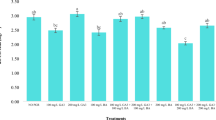Abstract
EXPERIMENTS in 1957 at the University of California showed that gibberellic acid (hereinafter referred to as gibberellin) affected set of fruit, berry size, elongation of cluster parts, fruit composition, and vegetative growth of grapes1,2. In the spring of 1958 delayed foliation and dead buds were noted on certain seeded varieties that had received high concentrations in 1957. Observations were therefore continued for two more seasons to determine the damage and to see whether production would return to normal.
This is a preview of subscription content, access via your institution
Access options
Subscribe to this journal
Receive 51 print issues and online access
$199.00 per year
only $3.90 per issue
Buy this article
- Purchase on Springer Link
- Instant access to full article PDF
Prices may be subject to local taxes which are calculated during checkout
Similar content being viewed by others
References
Weaver, R. J., The Blue Anchor, 34, 10 (1957).
Weaver, R. J., and McCune, S. B., Hilgardia, 28, 297 (1959).
Jacob, H. E., Univ. Calif. Agric. Ext. Serv. Circ. 56 (1931).
Winkler, A. J., Univ. Calif. Agric. Exp. Sta. Bull. 519 (1931).
Coombe, B. G., Ph.D. thesis, University of California (Davis) (1959).
Author information
Authors and Affiliations
Rights and permissions
About this article
Cite this article
WEAVER, R. Toxicity of Gibberellin to Seedless and Seeded Varieties of Vitis vinifera . Nature 187, 1135–1136 (1960). https://doi.org/10.1038/1871135a0
Issue Date:
DOI: https://doi.org/10.1038/1871135a0
This article is cited by
-
Hemmung der Bl�tenbildung vonVitis rupestris durch Gibberellin
Die Naturwissenschaften (1961)
Comments
By submitting a comment you agree to abide by our Terms and Community Guidelines. If you find something abusive or that does not comply with our terms or guidelines please flag it as inappropriate.



